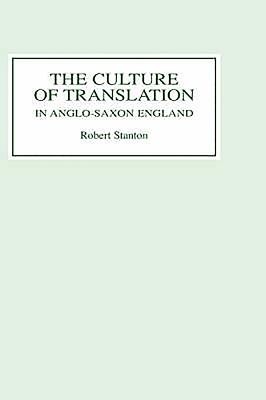
- We will send in 10–14 business days.
- Author: Robert Stanton
- Publisher: Boydell & Brewer
- ISBN-10: 085991643X
- ISBN-13: 9780859916431
- Format: 15.5 x 24.6 x 2 cm, hardcover
- Language: English
- SAVE -10% with code: EXTRA
Reviews
Description
Most Old English literature was translated or adapted from Latin: what was translated, and when, reflects cultural development and the increasing respectability of English.
Translation was central to Old English literature as we know it. Most Old English literature, in fact, was either translated or adapted from Latin sources, and this is the first full-length study of Anglo-Saxon translation as a cultural practice. This 'culture of translation' was characterised by changing attitudes towards English: at first a necessary evil, it can be seen developing increasing authority and sophistication. Translation's pedagogical function (already visible in Latin and Old English glosses) flourished in the centralizing translation programme of the ninth-century translator-king Alfred, and English translations of the Bible further confirmed the respectability ofEnglish, while Ãlfric's late tenth-century translation theory transformed principles of Latin composition into a new and vigorous language for English preaching and teaching texts. The book will integrate the Anglo-Saxon period more fully into the longer history of English translation.ROBERT STANTON is Assistant Professor of English, Boston College, Massachusetts.EXTRA 10 % discount with code: EXTRA
The promotion ends in 18d.11:18:22
The discount code is valid when purchasing from 10 €. Discounts do not stack.
- Author: Robert Stanton
- Publisher: Boydell & Brewer
- ISBN-10: 085991643X
- ISBN-13: 9780859916431
- Format: 15.5 x 24.6 x 2 cm, hardcover
- Language: English English
Most Old English literature was translated or adapted from Latin: what was translated, and when, reflects cultural development and the increasing respectability of English.
Translation was central to Old English literature as we know it. Most Old English literature, in fact, was either translated or adapted from Latin sources, and this is the first full-length study of Anglo-Saxon translation as a cultural practice. This 'culture of translation' was characterised by changing attitudes towards English: at first a necessary evil, it can be seen developing increasing authority and sophistication. Translation's pedagogical function (already visible in Latin and Old English glosses) flourished in the centralizing translation programme of the ninth-century translator-king Alfred, and English translations of the Bible further confirmed the respectability ofEnglish, while Ãlfric's late tenth-century translation theory transformed principles of Latin composition into a new and vigorous language for English preaching and teaching texts. The book will integrate the Anglo-Saxon period more fully into the longer history of English translation.ROBERT STANTON is Assistant Professor of English, Boston College, Massachusetts.

Reviews